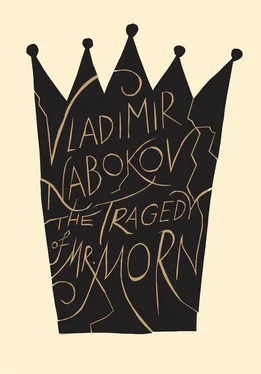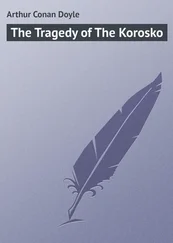finger back in affectation, when shaking
off his snot? No, you were mistaken!…
ELLA:
Move your head to the right a little… I’ll pull
the astrakhan fur on for you…
Papa,
sit down, I beg you… You are dizzying me
with your movements.
TREMENS:
You were mistaken!
Revolts there may have been, Ganus… Time and again,
in city squares across the ages, have gathered
low-browed criminality, mediocrity,
and baseness… Their words I was repeating,
but I meant something more—and I had thought
that through those blunt words you felt my true fire,
and that your fire answered mine. But now,
your flame has tapered, it has turned to passion
for a woman… I feel great pity for you.
GANUS:
But what is it you want? Ella, don’t get
in the way while I’m talking…
TREMENS:
Did you see,
one windy night, by moonlight, the shadows
of ruins? That is the ultimate beauty—
and towards it I lead the world.
ELLA:
Don’t protest…
Sit still!… Press your lips together. A little
touch of arrogance… There. Some carmine
inside the nostrils—no, don’t sneeze! Passion—
in the nostrils. Now yours are like those
of Arabian horses. There we go.
Please be quiet. After all, my father
is absolutely right.
TREMENS:
You say:
the King is a great sorcerer. Agreed.
The sun has swollen the taut granaries,
the wonders of science are accessible to all,
labour is lightened by the play of hidden forces,
and the air is clean in the warbling workshops—
with all this I agree. But why do we
always want to grow, to climb uphill
from one to a thousand, when the downward path—
from one to zero—is faster and sweeter? Life
itself is the example—it rushes headlong
into ash, it destroys everything in its way:
first it gnaws through the umbilical cord,
then tears up plants and birds into shreds,
and our heart beats inside us like a greedy hoof,
till it smashes through our chest… And the poet,
who breaks up his thoughts into sounds? Or
the maiden, who prays for the blow of a man’s love?
Everything, Ganus, is destruction. And
the faster it is, the sweeter, the sweeter…
ELLA:
Now
for the frock-coat, the gloves—and you’re ready!
Really, Othello, I am pleased with you…
[ declaims ]
“But yet I fear you; for you are fatal then
when your eyes roll so: why should I fear I know not,
since guiltiness I know not; but yet I feel fear…”
Oh, your boots are shabby—well, never mind…
GANUS:
Thank you, Desdemona…
[ looking at himself in the mirror ]
Well, look at me!
It’s been a while, it’s been a while… Midia…
a masquerade… Lights, perfume… quick, quick!
Hurry, Ella!
ELLA:
We’re going, we’re going…
TREMENS:
So,
you’ve decided to betray me, my friend?
GANUS:
Don’t, Tremens! We’ll talk some other time…
It’s hard for me to argue now… Perhaps
you are right. Farewell, dear friend… You
understand…
ELLA:
I won’t be late…
TREMENS:
Go, go.
Klian has long been cursing you, himself
and everything else. Ganus, don’t forget…
GANUS:
Hurry up, hurry up, Ella…
[ They leave together .]
TREMENS:
So, you
and I are left alone, my serpent chill?
They’re gone—my fugitive slave and poor
twirling Ella… Yes, seized and exhausted
by the simplest passion, Ganus seems to have
forgotten his true calling… But somehow
I sense that hidden within him is that spark,
that scarlet comma of contamination,
which will spread the wondrous cold and fire
of tormenting illness across my country:
deathly revolts; hollow destruction;
bliss; emptiness; non-existence.
CURTAIN
A party at MIDIA ’s house. The drawing room: to the left the entrance to the salon; to the right [ at the back ] a lighted niche by a tall window . [MIDIA with ] several GUESTS [ including KLIAN, DANDILIO, and the FOREIGNER].
FIRST GUEST:
Morn says—though he himself is not a poet—
“It should be thus: in the flicker of daily life,
unexpectedly, in the chance combination
of light and shadow, you feel within yourself
the divine happiness of conception:
it grabs you and is gone; but the muse knows
that in a quiet hour, in the seclusion
of the night, the poem will begin to beat
and fly off the tongue, fiery and babbling…”

KLIAN:
I have never felt like that… I myself
create differently: with persistence, disgust,
tying a wet rag around my head… Perhaps
that’s why I am the genius…
[ Both of them pass on .]
FOREIGNER:
Who is that—
the one that looks like a horse?
SECOND GUEST:
The poet Klian.
FOREIGNER:
Talented?
SECOND GUEST:
Shh… He’s listening…
FOREIGNER:
And that one,
the silvery one, with the bright eyes—speaking,
at the doorway, to the mistress of the house?
SECOND GUEST:
You don’t know? You sat beside him at dinner—
it is the carefree Dandilio, the grey-haired
lover of antiquity.
MIDIA [ to DANDILIO]:
But why? It is
a sin: Morn, Morn and only Morn,
and the blood sings out…
DANDILIO:
There is no sin on earth.
Loves, sorrows—all are necessary, all
are beautiful… One must snatch the hours of fire,
the hours of love from life, as a slave grasps
at shells underwater—blindly, hungrily:
there is no time to prise them open, to choose
the sick one, with its precious tumour… They
shimmer, suddenly turn up, so grab at them
in handfuls, whatever’s there, however you can—
and at that very moment when your heart
is bursting, you push off with your heel
convulsively, and, stumbling and panting,
empty out the treasure on the sunlit shore
at the feet of the Creator—he’ll sort them out,
he knows… So let the broken shells be empty,
for the whole sea hums with mother of pearl.
And he who seeks only pearls, setting aside
shell after shell, that man shall come to
the Creator, to the Master, with empty hands—
and he will find that he is deaf and dumb
in heaven…
FOREIGNER [ approaching ]:
I often heard your voice
in my childhood dreams…
DANDILIO:
Really, I never
can remember who has dreamt me. But
your smile I do remember. I meant to ask you,
courteous traveller, where have you come from?
FOREIGNER:
I have come from the Twentieth Century, from
a northern country, called…
[ Whispers .]
MIDIA:
Which one is it?
I don’t know that one…
DANDILIO:
How can you say that!
Don’t you remember, from children’s fairy tales?
Visions… bombs… churches… golden princes…
revolutionaries in raincoats… blizzards…
MIDIA:
But I thought it didn’t exist?
FOREIGNER:
Perhaps. I
entered a dream, but are you sure that I
have left that dream?… So be it, I’ll believe
in your city. Tomorrow I shall call it
a dream…
Читать дальше











